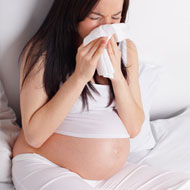 Cold Sores, which occur as blisters followed by open sores usually around the mouth, are caused by a herpes virus (herpes simplex type 1). Similar sores around the genital area, especially those caused by a different herpes virus (herpes simplex type 2), are of great concern for pregnant women. An active herpes outbreak in the genital area at the time of delivery is an extreme danger to the baby and requires a caesarean section delivery.
Cold Sores, which occur as blisters followed by open sores usually around the mouth, are caused by a herpes virus (herpes simplex type 1). Similar sores around the genital area, especially those caused by a different herpes virus (herpes simplex type 2), are of great concern for pregnant women. An active herpes outbreak in the genital area at the time of delivery is an extreme danger to the baby and requires a caesarean section delivery.
A natural delivery with a herpes outbreak risks transmitting the disease to the baby. Infant herpes is a far more serious disease than it is in adults, and can cause blindness, brain damage, or death.
Cold sores are different from genital herpes, even when they are caused by the same virus. (That is sometimes the case. It’s possible to have genital sores that are caused by herpes simplex type 1, or facial sores caused by herpes simplex type 2. The other way around, however, is much more common.) However, there are some concerns for both mother and baby when the mother suffers from cold sores.
Facts About Herpes And Cold Sores
Cold sores are caused by an infection with a herpes virus. The disease causes symptoms in outbreaks that usually last seven to ten days. An outbreak often begins with an itching, tingling sensation in an area of skin normally near the mouth. Swelling and discoloration are followed by an eruption of small blisters in a cluster. The blisters break open, resulting in an open sore that forms a scab-
Herpes is highly contagious, especially during an active outbreak. The disease may also be transmitted while it is in its dormant phase, but
transmission is much less likely when there are no symptoms present.
Risks For The Mother
The main risk for a mother who has herpes is increased likelihood of an outbreak. Pregnancy results in a weakened immune system. Pregnant women are at greater risk for all kinds of minor infectious diseases. Those who are already suffering from either cold sores or genital herpes are likely to experience increased frequency of outbreaks over the course of pregnancy. Pregnancy also causes increased stress
and worry, which also increases the risk of an outbreak. All in all, what this means is that if you have herpes, at least once and probably more than once during gestation you will have an outbreak of the illness.
There is no evidence that cold sores are worse or outbreaks longer-
Risks For The Baby
Genital herpes is very dangerous for babies, but only if an active outbreak is occurring at the time of delivery. Oral herpes (cold sores) carry a much lower risk of transmission during gestation and delivery than genital herpes. However, although very rare, it does happen and can result in serious injury or death of the infant. If you have cold sores and are pregnant, consult with your doctor about the possible risk of
infection.
Risk of infection from cold sores increases dramatically after the baby is born. This is not something that is specific to pregnancy, but simply the fact that herpes is an extremely contagious infection. If you have a cold sore outbreak –
Treatment Options During Pregnancy
Topical and symptomatic treatments (analgesics and so on) are generally safe to use during pregnancy. The big question mark surrounds acyclovir and other prescription or non-
A number of other treatments may be considered. Topical analgesics to reduce the discomfort of cold sores are safe to use while pregnant.
Good nutrition and reducing stress are likely to improve immune responses and so reduce the risk of an outbreak. As these are good ideas during pregnancy in any case, quite aside from any benefits they may carry in regard to cold sores, clearly they’re a good idea for that reason as well.
Caution is advisable with regard to herbal treatments and other home remedies, and any such treatments should be explored with a view to
finding out any possible pregnancy complications first.
